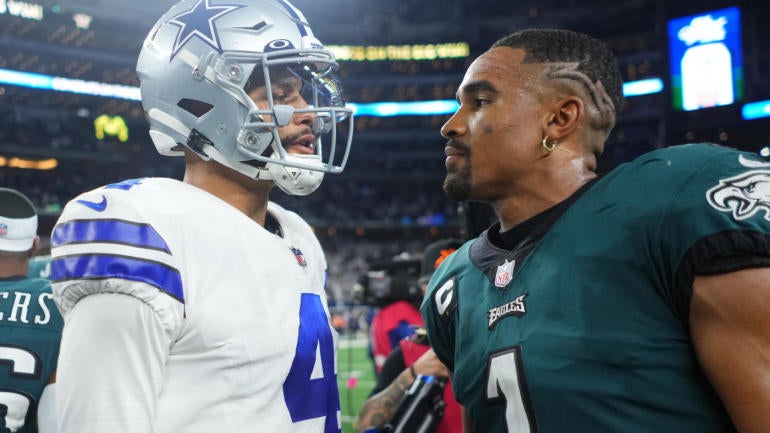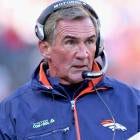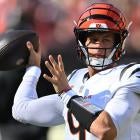
Right now, the Eagles and Cowboys have one thing in common -- they both were duds in the wild-card round of these NFL playoffs. My word. Philadelphia lost by 23 and allowed a 330-plus yard passer. Dallas lost by 16 at home and Packers quarterback Jordan Love averaged 13 yards per attempt in his postseason debut. Woof.
But which NFC East club is better positioned to bounce back in 2024? Or 2025? Let's breakdown each team's current situation to find an answer.
Finances
2024 cap space
Eagles: $28.5M
Cowboys: -$11M
The league average is currently $25.5M. Currently, this is clearly advantage Eagles. But it's common knowledge now that the cap situation can be rather easily manipulated in the offseason. Some cuts here, a few restructures here, an extension, and a team is cap compliant in the snap of a finger. How many additions to the roster does a team need to make to become serious contenders again? That matters much more. Are foundational pieces already on the roster and most of them signed long-term? Or do paramount second contracts linger?
For example, the Cowboys' in-the-red figure comes from 49 contracts signed through at least the 2024 season. The Eagles, only 42 contracts.
And yes, Micah Parsons is due for an exorbitant contract extension. He should get it this offseason. This is not a contract on which the Cowboys want to wait. The first year or two could feature low cap hit but then will balloon. And Parsons will deserve every dollar he receives from Jerry Jones.
Technically, the Eagles are in a better financial situation. But it's slightly more negligible than it appears on paper at the moment.
Advantage: Eagles, marginally
Free Agents
These clubs are about even when it comes to key free agents. The Eagles have Fletcher Cox, Brandon Graham, D'Andre Swift and Zach Cunningham. The Cowboys have Tyron Smith, Stephon Gilmore, Tony Pollard and Dorance Armstrong.
As mentioned above, the Eagles are a bit more financially capable of re-signing their own, but there's not a distinct advantage here either way.
Advantage: Push
Finding replacements for...
Jason Kelce just retired. Massive loss for Philadelphia. Also a perfect segue from the free agents section, because at this point, it feels like the Eagles will move on from Cox and Graham, two borderline Philadelphia football legends now well into their 30s. At running back beyond Swift, Boston Scott, and Rashaad Penny are free agents, but it feels like Howie Roseman and Co. understand not paying big bucks for that position is the best business practice in today's NFL.
While Lane Johnson is 33 years old, the Eagles agreed to a new deal with the stud right tackle in 2023, making a flat-out release essentially impossible. Trade-deadline acquisition Kevin Byard is a prime cut candidate, as Philadelphia can save $13M if the veteran safety is released. And 31-year-old cornerback James Bradberry and 33-year-old Darius Slay could both have the same fate. After a year in which the Eagles secondary was exposed as the season progressed, that component of the defense will need to find replacements this spring.
As for the Cowboys, the elephant in the room in Dallas centers around Dak Prescott and his $59M cap hit in 2024. Prescott had an MVP-candidate level regular season, especially from an advanced metric perspective. But it was marred by road losses -- and rather blah Prescott performances -- in Arizona (!), San Francisco, Philadelphia, Buffalo, and Miami. Then, of course, emphatically, in the playoffs. The Cowboys probably won't actively look for Prescott replacements this offseason but do probably need to make his deal make more sense long-term. Although close to $60M is going to start to be the going rate for a franchise quarterback.
What happens with soon-to-be 32-year-old DeMarcus Lawrence and his $20M cap hit in 2024? And Michael Gallup and his nearly $14M cap hit? Brandin Cooks and his $10M hit?
Advantage: Push
Young pieces
I'll come right out with it -- the Eagles are better positioned with young talent. That's directly thanks to prudent, long-view drafting by Roseman recently. Cam Jurgens was picked in Round 2 in 2022 to be the successor to Kelce at center. Tyler Steen on Day 2 last year to replace Jurgens at guard when that position switch happens. All the defensive line pieces -- Jalen Carter, Jordan Davis, Nolan Smith etc. -- to eventually be brought into prominent roles after Cox and Graham are done in Philadelphia.
Interestingly, as the Eagles ascended to Super Bowl contenders in the NFC, Roseman stayed true to his philosophies in the draft and always kept the future in mind, even if it meant some youngsters would start as "redshirts" behind established vets.
In Dallas, the pipeline isn't as loaded. Sam Williams is a nice young player on the edge. It would come as a shock to no one if he can eventually replace Lawrence as the No. 2 edge in Dallas. Jake Ferguson and Luke Schoonmaker, a fun youthful duo at tight end. Beyond that, there's not a noticeably ascending young talent on offense or defense on this Cowboys roster.
Advantage: Eagles
Draft capital
I've saved, arguably, the two most vital elements of team-building for last. The draft remains the lifeblood of every NFL franchise. And the Eagles are set to have eight picks in the 2024 NFL Draft.
- Round 1
- Round 2
- Round 2 (from Saints)
- Round 3 (projected compensatory)
- Round 5 (from Vikings or Buccaneers)
- Round 5 (projected compensatory)
- Round 5 (projected compensatory)
- Round 5 (projected compensatory)
If Philadelphia keeps all those picks, it'll be the most selections Roseman's made since 2021 when he had nine selections. And three picks in the first two rounds are vital.
The Cowboys have seven choices. Here they are:
- Round 1
- Round 2
- Round 3
- Round 5 (projected compensatory)
- Round 6
- Round 7 (from Raiders)
- Round 7
Because the Eagles currently own one more pick than Dallas, including three in the the first two rounds when the Cowboys only have two before Round 3, Philadelphia has the edge here too.
Advantage: Eagles
Quarterback
In my pre-season lookahead for the 2020 QB draft class, here's what I wrote on the season outlook for Hurts:
"Nothing regarding the Eagles as a team would indicate a regression is imminent for Hurts, yet I'm still not sure he can be relied upon to make challenging throws the game's elite passers make on a reasonably routine basis. However, because the Eagles are going to field a punishing offensive line and have assembled a phenomenal group of skill-position players, it probably won't matter for Hurts and Co.
It'll be another step forward for Hurts, and the Eagles are going to rock, again. But I don't believe he'll genuinely be on the same tier individually as the established elite passers by season's end."
While that prediction hit, in a way it didn't, because Hurts and the Eagles absolutely did regress during the 2023 season after the 10-1 starter. In that prediction, the specifics are poignant. From a traits angle, Hurts is a clear tier or two behind the premier quarterbacks in the NFL.
Sure, he was banged up all season. But he wasn't the only quarterback with bumps and bruises. He's a plus runner. We saw the limitations that arise from his lacking arm strength, and when the scheme isn't perfect, he doesn't have as much ability to elevate those around him as the aforementioned premier passers.
That's scary if you're the Eagles.
As for Prescott, at this stage of his career, 121 games in, we know what he is as a quarterback. He's an upper-level passer, with some mobility, a reasonably strong arm, and an affinity for disappointing in huge games, and he's been good, not great in the playoffs.
He's older, his contract is more prohibitive than Hurts, but for the next two or three years, I'm trusting Prescott -- yes, I just typed those three words, Cowboys fans -- more than Hurts individually as a quarterback.
Advantage: Cowboys
Verdict
You don't need to wonder how I'm weighing each category to determine the winner here. The Eagles have work to do, no doubt. But they are clearly more prepared to bounce back in 2024 and beyond than their bitter rivals from Dallas.

















